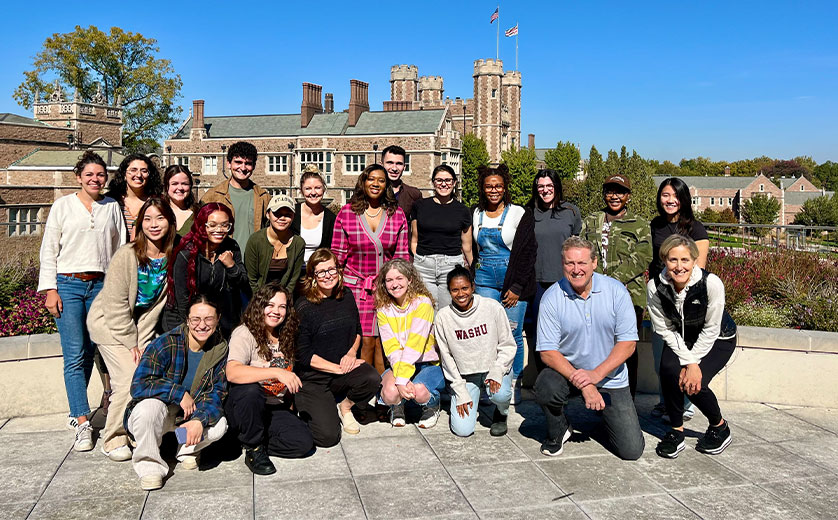Students from Washington University’s Brown School recently took their classroom lessons to the frontlines of local policy, offering public testimony on a bill aimed at expanding non-traditional housing options in the City of St. Louis. Their participation was part of the “Domestic Social and Economic Development Policy” course, designed to give students real-world experience in legislative advocacy and policymaking.
Taught by Senior Lecturer Molly Metzger, the course blends policy history with current debates on housing, economic development, and climate issues, while exploring the complexities of tax incentives and the compromises often involved in the political process.
“We don’t just talk about policy research; we discuss what it means to engage in this work as social workers,” Metzger said.
The testimony was part of an assignment that required students to either participate in or simulate public testimony. On Oct. 29, Metzger and 11 students testified before the City of St. Louis Board of Aldermen Housing, Urban Development and Zoning Committee about Bill 114, which proposes more flexible housing options to address homelessness and housing insecurity. The bill was approved by the committee and later passed by the St. Louis Board of Aldermen.
George Putney, a Master of Social Work student, called the experience transformative.
“Testifying before the St. Louis Aldermanic Committee was an excellent way to put theory into practice. The collective good that everyone that testified was part of opened my eyes to what can be accomplished if we get involved,” he said. “I believe our participation in the governmental process played a large role in the transitional housing bill (Bill 114) passing out of committee and passing the first vote of the full board. Hopefully the bill will become law within the next few months.”
Metzger, who chairs the Domestic Social and Economic Development concentration within the Master of Social Work program, said the experience helps students grasp the mechanics of policy and refine their advocacy skills. “This isn’t about perfection; it’s about showing up and participating in the democratic process.”
To prepare, Metzger and her students collaborated on strategy, but the students had full autonomy over their testimony topics and political positions. Each student also submitted a paper outlining their positions and strategies.
“I wanted them to think critically about their relationship to the policy,” Metzger said. “They could speak as data experts or share personal perspectives. The key was showing up and participating.”
For MSW student Samone Covington, the assignment was both daunting and empowering. Despite her nerves, participating in the public hearing was an easy decision.
“When I heard the various testimonies of both my peers and strangers I could feel the strong emotions behind them, which energized me for my own testimony. I was ecstatic when Bill 114 passed out of committee,” she said. “Being able to witness and be a part of the organizing of a few, fighting together and coming out victorious, felt amazing. I can’t wait for my next chance to testify.”
The bill’s sponsor, Ward 7 Alderwoman Alisha Sonnier, even visited the class to provide background and insights, highlighting the importance of local advocacy, according to Metzger.
“This is a reminder that a lot can be done on the local level, and that democracy requires skills that you can develop,” she said.
Metzger hopes the hands-on experience equips students with the tools to navigate and influence policy at various levels. “It’s about understanding the legislative process and thinking strategically about effective appeals,” she said. “Whether the issue is local, state, or federal, this exercise builds the civic muscle needed to make a difference.”
